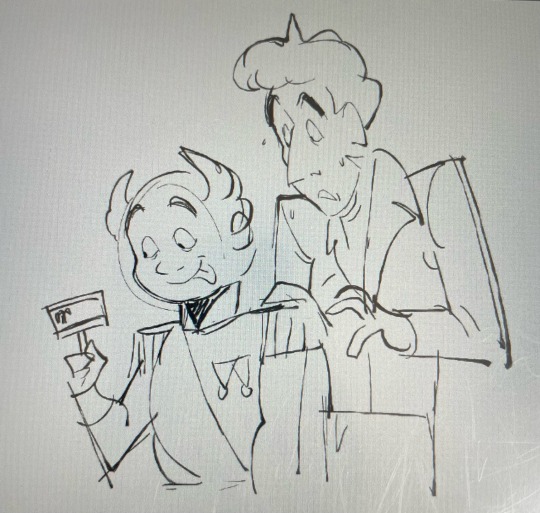#the congress of vienna
Text
watching a youtube video about the Congress of Vienna and laughing so hard at this image

“describe the russian tsar in 4 words or less”
#you can tell this guy is biased because of the portrait that he chose#tsar alexander i#the congress of vienna#history memes#alexander i of russia#he was apparently confused because alex wanted to be merciful to napoleon and was against the burbon restoration#and i’m like buddy. you don’t even know the lore.
269 notes
·
View notes
Text
The session of plenipotentiaries that never happened,
Or The tale of how I rediscovered that one lithography of Isabey’s famous painting in extremely high resolution and went through a total recall, so that everybody could suffer (myself including) ⭐️
The arrival of the Duke of Wellington had not only affected Vienna's diplomatic activity and social calendar; it was also posing a problem to the painter Jean-Baptiste Isabey, who was trying to capture the congress on canvas. He had been working for some time, and he had finally found a way to balance all the strong personalities, many of them patrons, into one single painting, and yet not offend national sensibilities or fragile egos.
The painting, which depicted the delegates gathered in a conference room, turned out to be a compromise in the best spirit of Vienna diplomacy.
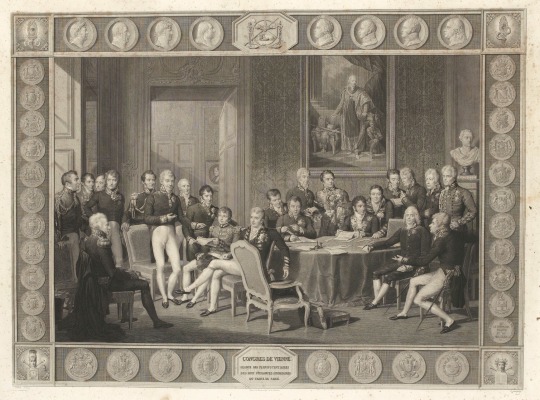
Metternich, the president of the Congress, draws the eye, as the only standing figure in the foreground.
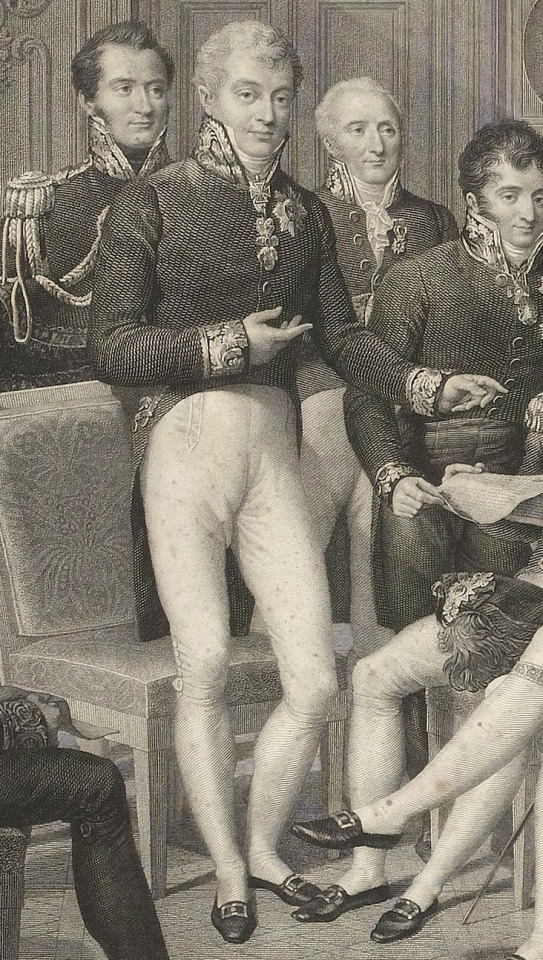
Castlereagh, though, commands the center, sitting with his legs gracefully crossed and elbow resting on the table.
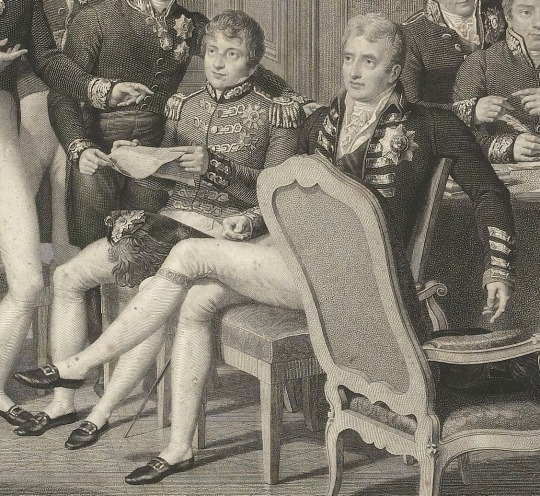
The light shining through the window, however, falls onto Talleyrand, sitting across the table with his dress sword at his side. An empty chair on both his right and left make him further stand out, as do the nearby figures who look to him, just as many of the smaller powers had sought his leadership the last few months.
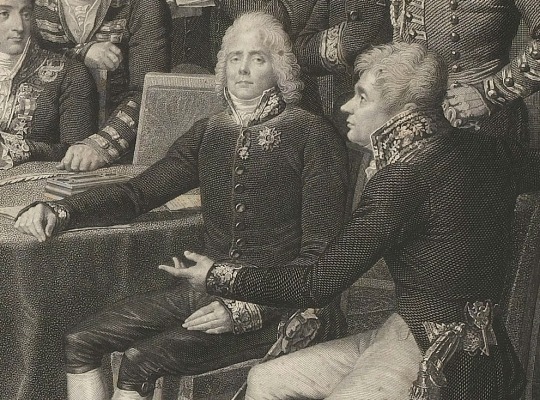
As Isabey was putting the finishing touches to his composition, he had to figure out what to do about the fact that the Duke of Wellington was now also in town. Starting over was out of the question. Omitting a man of his stature was equally impossible. Yet it was not easy to incorporate him into a canvas on which all the best places had already been taken. The painter's solution was simple and elegant: why not make the painting commemorate the Duke of Wellington's arrival in Vienna?
That way, the duke could simply be inserted on the far left side of the painting, without any insult to his position. As for the duke's reluctance to be painted from a side angle (he was self-conscious about his nose), Isabey had overcome that with a well-targeted compliment: didn't Wellington look like the handsome and chivalric Henry IV? Pleased with this comparison, Wellington accepted, joking that Isabey was a "good enough diplomat to take part in the Congress".
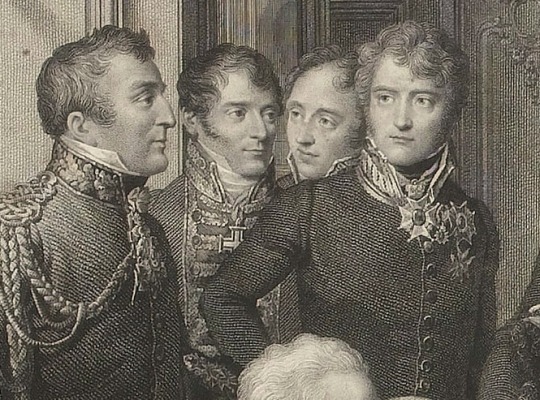
The painter also had to apply his finesse to convince Humboldt to enter the studio. The Prussian ambassador hated to have his portrait made, and, sure enough, he first declined, claiming that he had "too ugly a face ever to spend a penny" on a portrait. With this statement, Isabey saw his opportunity and emphasized that he would not "ask the slightest recompense for the pleasant trouble I am going to take". Isabey only wanted "the favor of a few sittings".
"Oh, is that all?" Humboldt quickly came around when he realized it would not cost him anything. "You can have as many sittings as you like".
Later, many congratulated Isabey on his portrait, particularly the fine job with Humboldt. The Prussian did not pay anything, as agreed, and Isabey got his revenge, Humboldt joked, by painting "an excellent likeness of me".
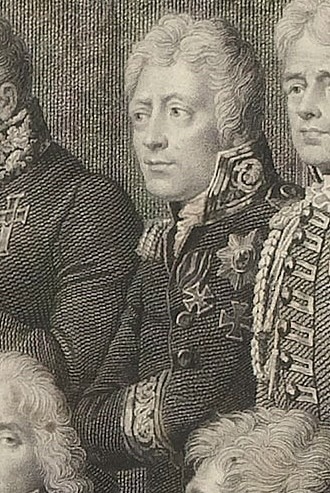
Few could complain of the treatment received from Isabey's flattering brush. This famous painting of the Congress of Vienna was pleasing to all, though typical of this peace conference, the scene was purely imaginary. The group of twenty-three delegates had never met in exactly this way before. Isabey had painted the portraits of each figure individually, and then later assembled the whole group together.
And so, symbolically, this simulated image would commemorate a congress that never was.
After that spectacular depiction of historical context surrounding Isabey’s magnificent canvas by David King few things are left to be added. I would simply love to highlight some other figures of utmost importance for the diplomatic life of that illustrious historical period - there are
Karl August von Hardenberg, Prime Minister of Prussia at the time;
Herren Wacken and Friedrich von Gentz, two Secretaries who were responsible for the protocols of the most important Congress' meetings;
count Karl Vasilyevich Nesselrode, a Russian-German diplomat, who was going to become state chancellor of the Russian Empire (in 1816);
prince Andrey (Andrew) Kirillovich Razumovsky, an extremely wealthy Russian aristocrat and diplomat, for whom Vienna was like his second home;
and we shouldn’t (or rather can’t) forget about general Charles Stewart-Vane, Castlereagh’s younger brother who definitely knew how to throw an unforgettable party, so refined aristocratic society could discuss his wild adventures at their fashionable salon meetings day and night. ✨
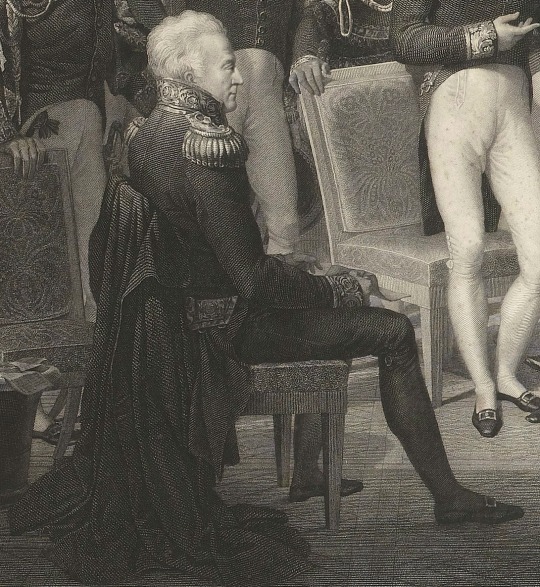
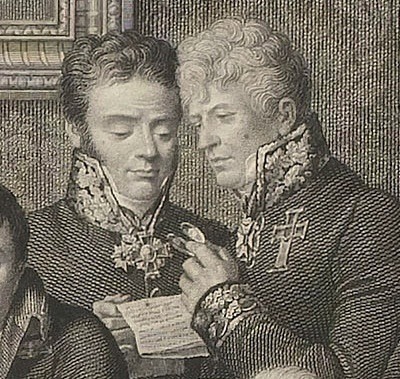
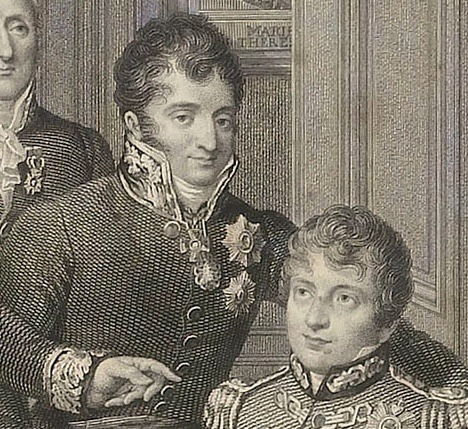
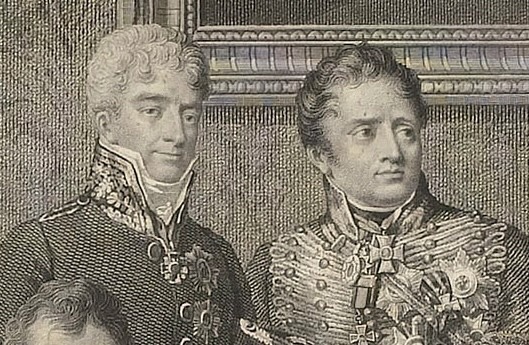
P.S.
Perhaps, there should be more posts with other details of the lithograph as well as Isabey’s original canvas, I’ll just need some time and motivation for that. 👌
#I bet some people know perfectly well what was playing in the background during the arrangement of this post 🤫#the congress of vienna#klemens von metternich#metternich#robert stewart#lord castlereagh#charles-maurice de talleyrand-périgord#talleyrand#wilhelm von humboldt#humboldt#hardenberg#friedrich von gentz#nesselrode#prince razumovsky#charles stewart-vane#napoleonic era#napoleonic wars#19th century#1814#1815
43 notes
·
View notes
Text

Lineup remake
#pre-thesis month is killing me but hi im back but not for long#my art#congress of vienna#napoleonic wars#19th century#alexander i#klemmens von metternich#talleyrand#lord castlereagh
59 notes
·
View notes
Text
Yoo! Disney+ is currently producing a six-episode satirical series about the Congress of Vienna titled "Vienna Game".
Actor Donskoy describes it like this: "Set during the Vienese Congress of 1814 - where kings, queens and players decided upon the fate of Europe as we know it. Mainly with bedroom politics."


As always low expectations, but nonetheless...
#congress of vienna#they have already announced the cast but not who they play#can't wait to bitch about it
39 notes
·
View notes
Photo

le Congrès de Vienne ne marche pas, il danse.
- Napoleon Bonaparte
#bonaparte#napoleon#napoleon bonaparte#quote#dance#louvre#congress of vienna#european history#politics#europe#art#beyonce#dancing#dancer#pun#word play
164 notes
·
View notes
Text
Something something at the Congress of Vienna the moment where Ivan gets Roderich and Gilbert onside for his Holy Alliance aka the "Christian Union of Charity, Peace, and Love" aka the "we each 'protect' Orthodox, Protestant and Catholic Christianity and boo secular liberalism" friendship was also the moment where - since the Napoleon Tornado - Arthur and Francis looked at each other and went 'Oh maybe you're not so awful in context actually'.
I mean, the French called the Russian/Prussian/Austrian agreement an apocalypse of diplomacy and Britain called it a piece of sublime mysticism and nonsense so... you know.
Also the Ottomans sitting on the side like what the actual fuck is this nonsense. And the Pope.
#to be fair gilbert and roderich were probably also like lol okay whatever floats your boat Ivan#truly one of the odder moments of 19th century diplomacy#hetalia#historical hetalia#honestly i could have a series just on the congress of vienna and how mad it could be#op
31 notes
·
View notes
Text
At sixty years old, Monsieur de Talleyrand was showing signs of age. His blue eyes which, over a long career, had watched a thousand deceits, were not so much cold as habituated to an expressionless glitter. The naturally fair flesh of his face was pale, sagging and dead. It fell in folds around a supercilious mouth which suggested at one and the same time satiated self-indulgence and utter disdain. Many thought of him as reptilian.
—Excerpt from Napoleon and the Hundred Days, by Stephen Coote.
36 notes
·
View notes
Text
There's a great esprit de corps between libertines and rascals.
"C'est qu'il y a un grand esprit de corps entre les libertins et les coquins." - From an Austrian police report (5 February 1814) about the ostentatious close friendship between tsar Alexander I and Eugène de Beauharnais during the Vienna Congress. Or, as the report puts it, about Eugène being "the Russian emperor's most intimate company".
(Source: A. Fournier, "Die Geheimpolizei auf dem Wiener Kongress. Eine Auswahl aus ihren Papieren", Wien und Leipzig 1913)
10 notes
·
View notes
Photo

Europe after the Congress of Vienna, 1815.
by @LegendesCarto
63 notes
·
View notes
Text
“Bonaparte has an insatiable desire to DOMINATE.” — Talleyrand
The entire Congress of Vienna in 1815 politely pretending this is the first time they’re hearing of this:
#Talleyrand#congress of Vienna#Napoleon shit post#napoleonic era#napoleonic#19th century#napoleon#napoleon bonaparte#history#France#meme#napoleon memes
43 notes
·
View notes
Text
My dealer: got some straight gas 🔥😛 this strain is called “the Congress of Vienna” you’ll be zonked out of your gourd 💯
Me: yeah whatever I don’t feel shit
5 mins later: I think I just saw the Russian tsar in a woman’s dress
my buddy Metternich, pacing: Napoleon has escaped from Elba…
#history memes#napoleon bonaparte#napoleonic wars#the congress of vienna#tsar alexander i#klemens metternich
87 notes
·
View notes
Text
Late decoration of a Christmas tree accompanied by that one film about the Congress of Vienna which gets even worse after every single rewatch… However, I enjoy it a lot anyway. X)

Peculiar choice of a favourite holiday film, for sure, but who am I to judge myself… Especially for Conrad Veidt!
On this cheerful note I’d love to wish everyone in the Napoleonic community Merry Christmas and a Happy New Year! Hope that despite all odds common interests are going to unite people all over the world forever and ever. 🎄⭐️
20 notes
·
View notes
Text
Wellingtons Sieg: Aesthetically Pleasing or Populist Potboiler?
This is a post responding to @empirearchives on this question: "Was Wellington’s Victory popular in Vienna because of the quality of the music itself or because of the political context (Austrians celebrating the defeat of Napoleon)?” I examine the background of Wellington's Victory and its audiences in reference to Beethoven’s heroic aesthetic and in comparison to the Eroica. In my final paragraph, I also attempt to engage with this post by @diagnosed-anxiety-disorder. (Hi! I love your enthusiasm for classical music and Napoleonic history! It’s just that Idk how to socially interact djflskdjf,,,) WARNING: LONG.
To answer the question, Wellington's Victory—or, in German, Wellingtons Sieg—was entangled with its political context in the outset, so judging its popularity by separating its context from its aesthetic qualities is impossible. Let me touch on the political and aesthetic qualities of the piece in turn.
Wellingtons Sieg was comissioned by Johann Nepomuk Mälzel (aka. the guy who gave Beethoven his ear trumpets) for celebrating Wellington's success in the Battle of Vittoria. It was, further, made to be played on Mälzel's panharmonicon, which was a mechanical orchestra based off of barrel organ technology. At the very same time, real barrel organists would have been in the streets playing lowbrow pieces that celebrated Wellington, so the piece had common themes with the popular music of the day. Thus it is unsurprising that Beethoven wrote Wellingtons Sieg was "nothing but an occasional piece" [nichts als ein Gelegenheitsstück], but he did not mean it pejoratively; he was acknowledging its historicity.
When discussing musical merit, the arbiter of a piece's aesthetic qualities are always its audiences. Austria in 1813 was a police state that censored anti-Royalist sentiments and lauded pro-Royalist ones, so Wellingtons Sieg, commemorating an Austrian ally's victory, would have inavariably been well-received in terms of aesthetics and political content. Laura Turnbridge, in chapter six of Beethoven: A Life in Nine Pieces (2020), points out that Wellingtons Sieg "premiered in the University Hall on 8 December 1813, at a charity concert in aid of Austrian and Bavarian soldiers wounded in the recent Battle of Hanau.” Turnbridge continues:
Wellingtons Sieg was enthusiastically received and played again and again, including at no fewer than five benefit concerts in which Beethoven participated, on 2 January, 27 February, 29 November, 2 December and 25 December 1814. At the first of these, at the Großer Redoutensaal, Beethoven played up the piece’s spectacular potential by having the French and British bands advance towards each other down long corridors on either side of the hall. The hall seated up to a thousand people and the orchestra was unusually large for these concerts, numbering 120 players, an aspect that Beethoven noted with glee in his diaries [...]. Beethoven attempted to add a further patriotic spin to the January concert, trying to arrange for a statue of the Kaiser, which stood in the hall, to be revealed from behind a curtain on being summoned by Zeus in his incidental music for Die Ruinen von Athen (The Ruins of Athens). The Russian Emperor Alexander and other leaders were invited to attend his academy on 29 November, which also included the Seventh Symphony and a new cantata, Der glorreiche Augenblick [...].
The sovereigns and soldiers that Wellingtons Sieg was made for certainly loved its aesthetic qualities, but said qualities had different qualifiers to our aesthetic preferences of Western art music today. This means the overtly political nature of Wellingtons Sieg makes it impossible to be judged by modern aesthetics. Nevertheless, it cannot be said Wellingtons Sieg was only popular with the public, for it was appreciated for its artistry, or at least for the composer behind it. In these contexts, Beethoven was lionised as much as Wellington, the subject of his piece. The following is from Nicolas Mathew, in his 2006 article "History under Erasure: Wellingtons Sieg, the Congress of Vienna, and the Ruination of Beethoven's Heroic Style”:
Shortly after attending the Akademie on 2 January 1814 while in Vienna, the Romantic poet and Beethoven fanatic Clemens Brentano, brother of Beethoven's friend and correspondent Bettina, sent his hero the “Vier Lieder von Beethoven an sich selbst" (Four Beethoven Songs to the Composer Himself) and an effusive, barely coherent covering letter. The third poem resounds with a confluence of archaic musical and military imagery, taking the transposition of Beethoven and Wellington, Leyer und Schwert [lyre and sword], as its central conceit. "Du hast die Schlacht geschlagen, Ich habe die Schlacht getont" (You have fought the battle, I have set the battle to music), it begins, eventually reaching this exhortative finale:
Die Rosse entspann' ich dem Wagen
Triumpf! auf Tonen getragen,
Zieht mein Held ein, der Ewigkeit Pforten
Rufen in meinen Akkorden,
Wellington, Viktoria!
Beethoven! Gloria!
[I slacken my steeds from the chariot
Triumph! Carried upon tones,
my hero moves into the Gates of Eternity
Summoned in my chords,
Wellington, Victoria!
Beethoven! Gloria! ]
There was more fanboying, but you get the idea. Nor was the popularity of Wellingtons Sieg limited to the Congress of Vienna—it was celebrated long after the end of the Napoleonic Wars. In 1824, the highbrow musicians and music lovers who begged the increasingly reclusive Beethoven to put on a concert in Vienna (to combat the dominance of populist Italian opera) referenced only one of his compositions: "For years, ever since the thunders of the Victory at Vittoria ceased to reverberate, we have waited and hoped to see you distribute new gifts from the fullness of your riches to the circle of your friends.” Beethoven was evidently comfortable with the popularity his ode to Wellington’s victory earned, as he alludes to the piece when writing to Count Franz Brunsvik on 13 February 1814 about the progress of war: "no doubt you are delighted about all the victories—and mine also.” It is implicit that Wellington’s victory is also Beethoven’s triumph—while Beethoven's heroic image was constructed in Napoleon's Eroica, his heroic credentials are equally prominent in Wellington’s Sieg.
To me, the Eroica and Wellingtons Sieg are two articulations of the same heroic theme (regardless of how “bad” they sound). A. B. Marx, a Berlin critic that Beethoven admired, compared both works in a dialectical analysis. Aside from defending the unsutble tone painting of Wellingtons Sieg, he posited that Wellingtons Sieg was an external realisation of the internal Kampf-und-Sieg of the Eroica—two sides of the same coin. As Mathew puts it,
Wellingtons Sieg—with its fanfares and marches, its battle, its realism, its extrinsic historical derivation, its sheer explicitness—offers a perspective on the poetic content of the Eroica. By turning the Eroica toward the world—by providing a concrete realization of its guiding poetic idea, as Marx would have it—Wellingtons Sieg becomes a hermeneutic key, a kind of musical exegesis.
While Marx toned down the narrative foiling of the Eroica and Wellingtons Sieg in a later biography of Beethoven, he cannot deny that both works spring from the same heroic seed—Beethoven’s struggle-and-victory model of composition. Their popularity as of 1813 in large part came from its famous composer, whose name made it part of the Viennese repertoire. From an artistic perspective, rather than being partial to either side of the political conflict, Beethoven's heroic approach to music simply found the next Great Man to eulogise. In doing so, he transcended the “greatness” of both his subjects, a greatness that is only beginning to be deconstructed by scholarship.
It was only when the Napoleonic era grew increasingly distant that Wellingtons Sieg was seen as problematic by critics. Mathew points out that while there were mixed responses to the piece, it was a more than decade later that "contemporary critical misgivings about Beethoven's imitative music prompted a fully argued polemic against Wellingtons Sieg" (notably, Gottfried Weber's 1825 review of it in his journal Cäcilia, who Beethoven responded to with his profanity-laden quote). Weber’s opinion shaped musicology’s indictment of Wellingtons Sieg. It was certainly aesthetically pleasing to the shell-shocked veterans of 1813, and continued to delight highbrow and lowbrow audiences until political and musicological circumstances pushed it into obscurity. Finally, let’s face it—Wellingtons Sieg simply didn’t fit the image of apolitical, isolated artistry that Beethoven enthusiasts wanted to elevate him to, by conveniently forgetting that Beethoven had to eat too.
Serious analysis aside, here’s a hot take: I think Napoleon would have enjoyed Wellingtons Sieg a lot more than Beethoven’s famous works. According to the article @empirearchives has linked for us (a good starter guide), that man’s music taste was so out of line with what we think is the Western canon today! Paisiello certainly isn’t being revered as the Italian genius of the 1790s by the general public. And which average classical music enthusiast has heard of Jean François Le Sueur, much less broadcasted the music of Napoleon’s coronation on the radio? The musical hegemony of Beethoven, apparent sympathiser of Napoleon, has ironically shoved the pleasant, simple melodies and the opera that Napoleon liked out of the spotlight. And that was exactly the type of music a great number of Beethoven’s contemporaries liked—give Napoleon catchy motifs based on war marches, easy melodies, and some tone-painting, and he’s a happy audience.
I hope my response isn't too confusing and that it shed some light on the question. If you want any further sources or proper citations, please ask and I will reply accordingly!
#clickbait: accidentally wrote an essay on wellingtons sieg#ludwig van beethoven#napoleon bonaparte#classical music#congress of vienna#wellington's victory#to everyone whose posts i haven't read!! sorry!!! i'll catch up on them when i can ;;;;;
25 notes
·
View notes
Text
#putting this here bc I'm SO personally attached to this one but it's like impossible to find anywhere & you can't even buy it anymore#I had to take this version off a youtube video#anyways I've had so much fun dancing this waltz in the past <3#thoughts#congress of vienna waltz#music
22 notes
·
View notes
Text
A good day is when I find and get more books in my favorite second hand bookstore.
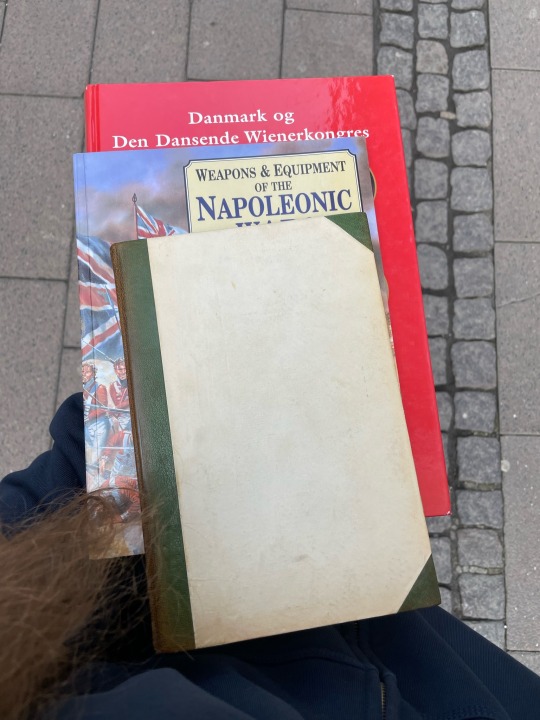
#my grandmother is going to kill me if she sees me buys more books#I’m not sneaking alcohol like most my age. I sneak in books.#historical#books#napoleonic era#congress of vienna#Napoleon Bonaparte#weaponry#personal
3 notes
·
View notes
